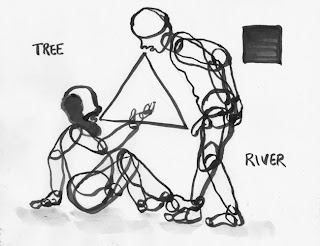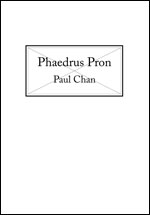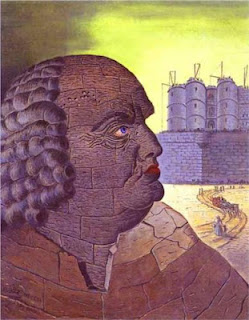American artist and activist Paul Chan’s Phaedrus Pron, a ‘hyper-translation’ of Plato’s Phaedrus, is worth looking at. Here are thirteen ways you can get into it:
1. You can watch the trailer (yes, this book has a trailer):
****Viewer Discretion Is Advised****
2. You can listen to Chan reading an excerpt for you and here what he has to say about Plato in general:
**** Listener Discretion is Advised****
http://www.badlandsunlimited.com/media/Paul_Chan_reading_Phaedrus_Pron.mp3
3. You can transport yourself back to Athens, between October-December in 2011, and attended the performance of Phaedrus Pron as part of the project Word of Mouth, curated by KERNAL at the 3rd Athens Biennale:
 |
| Antonis Vathis (Socrates), Yorgos Tsamis (Phaedrus) performing Phaedrus Pron at the 3rd Athens Biennale, 2011, Word of Mouth. http://thewordofmouth.net/ |
4. You can interpret Chan’s drawing for the Word of Mouth performance to glean what the performance or his book are all about:
 |
Phaedrus Pron staging sketch by Paul Chan, 2011http://thewordofmouth.net/# |
5. You can enjoy these hypnotic animation of the book’s pages being turned or Kindle being used:
 |
| fhttp://www.badlandsunlimited.com/images/books/phaedrus_paperbook_big.gif |
 |
| http://www.badlandsunlimited.com/images/books/phaedrus_kindle_big.gif |
6. You can even ‘read’ Chan’s text itself (either as free pdf download, for you iPad of Kindle, or a special edition printed book):
**** Reader Discretion Is Advised ****
 |
| http://www.badlandsunlimited.com/books.html |
7. You can read some Marquis de Sade and ask yourself what this has to do with Plato’s Phaedrus:
 |
| Man Ray Portrait imaginaire de D. A. F. de Sade, 1938 Oil on canvas with painted wood panel 24 1/4 x 18 3/8, The Menil Collection, Houston, Texas |
8. You can re-read Plato Phaedrus (at The Internet Classics Archive) and think about what Socrates and Phaedrus want:
http://classics.mit.edu/Plato/phaedrus.html
9. You can read Alain Badiou’s hyper-translation of Plato’s Republic and wonder how he would go about making the Phaedrus contemporary.
10. You can ask read the following description of the work written by Chan, once again for the 2011 Word of Mouth performance in Athens:
It is interesting that the philosopher who is considered the greatest and perhaps the first is also the one who never wrote a thing down and considered philosophy as nothing other than hanging out and talking. This is what we must remember: Socrates lived and Plato wrote. And it is not clear at all how Socrates would have felt about how his former student Plato used him as inspiration, puppet, pet, substitute, teacher, student, and foil.
But not lover. How speech turns into acts is not unlike how two people come to become one. Socrates knew. But did Plato?
I wrote Phaedrus Pron with this in mind. Tonight, as you listen and watch what is happening unfold, and as you get bored and look around, trying to find someone to seduce and sleep with tonight, what will you say to them so that he or she will relent, or become interested enough to care? These are the words that matter. But in many ways, it isn’t the words at all that do the trick. It is the rhythm. Rhythm makes meaning mean.
Your world is crumbling. Where will you find what matters, and how will you turn them into forms?
(text taken from http://thewordofmouth.net/#)
11. You can think about Plato’s Cave while looking into two of Chan’s other projects –
The 7
Lights
(2007) Sade for Sade’s Sake (2009)
12. You can find out what Alternumerics are:
http://www.nationalphilistine.com/alternumerics/
13. You can actually read Jacques Derrida’s The Post Card: From Socrates to Freud and Beyond (1987)
Any which way, Plato’s Phaedrus will never be the same again.
For more information on Paul Chan, visit http://www.nationalphilistine.com/


